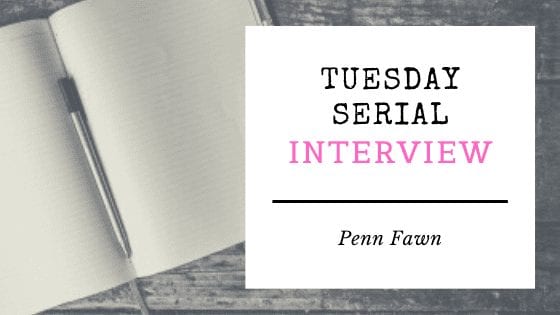This week we are so excited to sit down with indie author, Penn Fawn, to discuss writerly things and about his current serial, Necropolis.
Enjoy!
________________________

Penn Fawn
If you were to introduce yourself to a group of strangers, what would you say?
If by that you mean strangers interested in finding out about my writing endeavors, well, after saying my name is Penn Fawn I’d proudly add I’m an indie author. After that, I’d say a bit about my current work. It’s important to state I’m an indie right away because that does leave a certain impression on whomever you speak to, including this impression, “oh, another wannabe writer,” a characterization I wholeheartedly deny and embrace simultaneously. Indie authors are authors too. Yes, this is true, in spite of the variation in quality to be found among their collective work. The same thing is true for traditionally published authors, by the way. Sell a lot of books as an indie and watch how quickly attitudes toward you by the powers that be will change. They know very well what era we’re living it and what time it is.
Tell us what first drew you to writing.
I’m not sure what drew me to writing. What I recall was I was around eighteen or nineteen years old when I knew creative writing was something I wanted to pursue. There are no influences, in particular, I can think of. I just knew I wanted to do it.
Do dreams inspire your writing ideas?
Literal dreams? No, but if by dreams you mean hopes or aspirations of one day being a full time writer, the answer is yes.
Tell us about your current serial work.
My current work is a dark fantasy series entitled, Necropolis. The sub gene under fantasy is called grimdark. At the general most basic level it is a series about there being life after death and that afterlife is far more terrifying than any biblical description of hell. Within the narrative, burning in a lake of fire, for example, is just one of the many horrors awaiting mankind.
However, a more perceptive reader will grasp that on a deeper level the series is not merely about fantasy/horror or retribution. Rather, it also belongs to a genre called eco-fiction. In brief, eco-fiction, as defined by Wikipedia is: the branch of literature that encompasses nature-oriented (non-human) or environment-oriented (human impacts on nature) works of fiction.
The central figure in Book One is the antagonist environmentalist named Nyeusi, one who can move between this realm and the underworld. He appears on the book’s first page and is the one who directs three lions that maul three poaches about to kill elephants for a gold-seeking big game hunter/collector named Ali. The beginning is one of many examples throughout the first book aiming to show rather than tell what the work at its core is about.
What prompted you to serialize your story?
To spread word about it and myself to an audience open to reading work written in a serialized format.
How do you structure each entry?
I don’t write off the fly or work from an outline currently being brought to life. I write the whole book then put it through the thorough editing process a work that is intended for release should be put through. After that I release chapter by chapter of the final polished piece.
How do you setup the story to ensure the reader comes back for the next entry?
I don’t pay any attention to that at all, like say for example intentionally end each chapter on a cliffhanger.
What kind of reader engagement have you tried? What has worked?
Publishing the work in serial form is the only serious attempt at reader engagement I’ve given time to so far. Other than that I’ve dabbled a bit with setting up giveaway URLs on sites like BookFunnel and Instafreebie, now called Prolificworks. I’m still working on my promotional and marketing plan.
What are the greatest challenges to writing serial fiction?
For me I never have to worry about them because again, I don’t write off the fly or work from an outline currently being brought to life. I write the whole book then put it through the thorough editing process a work that is intended for release should be put through. After that I release chapter by chapter of the final polished piece.
What are the greatest benefits to writing serial fiction?
I don’t know whether this is one of the greatest benefits, but to me it presents a tremendous opportunity to spread word about yourself and your work in small bits at a time. The gradual buildup, as far as I am concerned, is a great thing.
What do you love/enjoy most about serial fiction?
I like being able take in a work that interests me a little bit at a time and in this day and age, thanks to smart phone apps, I’m in heaven given the resurgence of this kind of writing now available online.
What would you tell someone about to try writing serial fiction for the first time?
I’d tell them it’s well worth giving it a try especially if you’re someone like me, someone who’s new, obscure, or is working on building your base or author platform.
What do you think the future holds for serial fiction?
I think it’s great that it made resurgence and is not going anywhere. The rise and popularity of sites like Wattpad for example, speaks to this. Obviously there’s an audience for serial fiction and that is not going to go away any time soon. That is if it ever goes away.
______________________________

Necropolis
Links to where you can read Penn Fawn’s Necropolis (Book One of Book One):
Also check out his other sites:
_____________________________________


